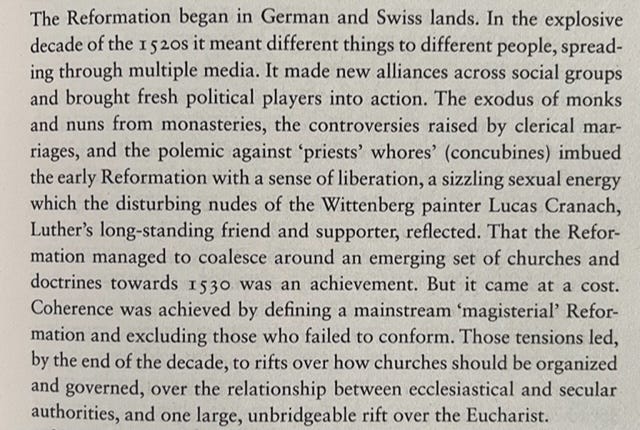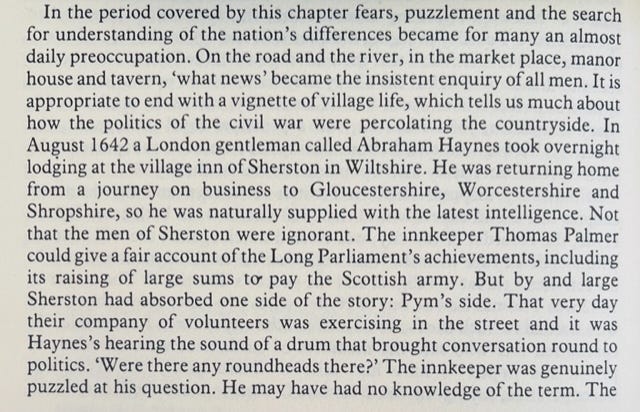Destructive creation
Kershaw's Dozen, Sheffield Revisited
Personality and Power: Builders and Destroyers of Modern Europe - Ian Kershaw (Allen Lane) published 29 September 2022.
Our familiarity with the milestones of the rise and fall of the Third Reich – the one historical timeline my compatriots have internalised along with the Tudor succession – means that everything now feels preordained.
Military humiliation without national reeducation, the Beer Hall Putsch, the Wall Street Crash, the 1930 and 1933 elections, conservative accommodation, the Reichstag fire, the Enabling Act, appeasement of the Rhineland-Anschluss-Sudetenland interventions, Kristallnacht, war, defeat and cultural rewiring.
1923 and all that.
Except, of course, it wasn’t clockwork, especially in its early stages. People weren’t living through history at the time. They were living through news. The von Papen1 gamble might have paid off; authoritarians have been tamed by government before and since. At root, Adolf Hitler’s German conservative enablers suffered from a failure of imagination driven by short-term self-interest. His foreign enablers - Neville Chamberlain and Lord Halifax - calculated that they were dealing with a rational actor who, once he had united (gentile) German speakers, would return to a national-socialist domestic agenda. They wouldn’t love it but it wouldn’t be their problem.
Thanks to Vladimir Putin and Donald Trump, the catastrophic failure of the 1920s-1930s political class feels more understandable. With few exceptions, today we all despise the “guilty men” of appeasement yet how many of us advocated confrontation with Putin when he began a war with Georgia in 2008 or invaded eastern Ukraine and annexed Crimea in 2014? We’re living 20th-century history in real time. Trump is, despite his fact-free admiration for the Führer’s governing style, no Hitler (probably). But, the experience of the seven years since he announced his presidential candidacy, has been to live the history of how democracies die - the subject of three of the 12 profiles in Ian Kershaw’s new book: on Hitler, Benito Mussolini and Francisco Franco.
Of the three, Mussolini’s fascism is the nearest analogue to the present danger. Selectively militaristic, motivated more by a hatred of the left than any societal vision (“Ideas in themselves were not important to him unless they could mobilise, unless they were vehicles to power”), obsessed with “strength, virility, will, dominance”, and channelling disparate gangs into a single movement dedicated to the ascendancy and protection of the Duce. Like Mussolini, Trump would be nothing but an ill-disciplined demagogue with deployable militia without his von Papens and institutional weaknesses. So far these have held but will they survive a second term?
This institutional test is Kershaw’s focus. Unsurprisingly for a historian who made his name by stressing how Nazi-state institutions, their rivalries and bids to preempt the dictator’s wishes were more determinative than Hitler himself, this is not a “great man” history. It’s an exploration of how 12 leaders were “able to acquire and exercise power and to what extent that power transformed Europe in the twentieth century”. Each chapter examines the individual’s importance but also the “impersonal, structural conditions that made the impact of the individual possible”.
It’s a motley crew with oddly common personality types - a single-minded will to power, and a resistance to delegate in government that often left them drowning in detail and making strategic mistakes. While interesting in themselves, I couldn’t help but wonder why Franco or Tito qualified for the 12. As Kershaw admits, Tito’s “personal impact on historical change was … significant but transient”. National politics in Spain and Italy still contain trace elements of Franco and Mussolini but are the real-world left/right divisions any sourer than those in France? The seeds of Brexit preceded Margaret Thatcher and her broader political legacy is mostly confined to the UK but her championing of the single market qualifies her as a “builder”, I suppose.
Yet the others are on another level. In terms of their personal legacy for Europe today, it felt like a toss-up between the last two subjects: Mikhail Gorbachev and Helmut Kohl. As Kershaw points out, without Kohl’s personal belief and authority, swift German unification wouldn’t have happened. But it was Gorbachev’s removal of the Soviet security guarantee that ended communism in Europe almost overnight, led to the EU’s eastward expansion, and to German unification. It was his concession that a united Germany could be a NATO member that set a precedent for the rest of the east. His ending of centralised rule broke the USSR, leading to the ascent of Boris Yeltsin and gangster capitalism and the foundational stab-in-the-back myths of later-stage Putinism. No one else comes close.
Barber House revisited
When I wasn’t reflecting on Trump and Putin as I read this book, I was thinking about the University of Sheffield’s history department. It was Kershaw - appointed Sheffield’s professor of modern history five years after I graduated - who put the department on the map in 1998-2000 with his best-selling, two-volume Hitler biography.
When I got there in 1981, the department’s Barber House home – now part of Sheffield’s medical faculty – was a cosy redbrick without Kershaw-like marquee names. I’m pretty sure Michael Bentley, author of the go-to 19th-century textbook Politics Without Democracy 1815-1914, was on writing leave. Anyway, I never met him. David Luscombe, who sadly died last year, was head of the department - an ecclesiastical historian with a niche specialism in 12th-century renaissance man Peter Abelard. Anthony Fletcher's Outbreak of the English Civil War was hot off the press and I remember well – during a weekend second-year trip to Losehill Hall with the entertaining Richard Carwardine among others – his colleagues’ excitement at the book’s critical reception.
I’d chosen Sheffield because, as a sixth-former, I suffered from a severe case of northern snobbery – an affliction soon cured by Granada TV’s release of Brideshead Revisited that autumn. I chose History because it seemed meatier than English or French (my other A Levels) and the more reliable route to becoming my idea of an “intellectual” – a cool one: Gauloises, not pipes. This plan foundered on first contact with the enemy – an opening lecture from medievalist R. I. Moore (one of the last in the tradition of initialled historians). While I don’t recall the subject exactly, I do remember two things: his admiration of Fernand Braudel and his reading list. It was epic and, in my naivety, I thought I had to read it all before the lecture a week later – along with every other list for every other course.
Running to catch up (and failing) combined with the development of an unhealthy interest in unreadable Marxist theory soon derailed my historical studies. A voracious reader of anything except history, by year three I was so absent from seminars and tutorials that Patrick Renshaw – author of a page-turner on the legendary Industrial Workers of the World ("The Wobblies”) – wrote to enquire about my whereabouts. His letter to 455 Crookesmoor Road began: “Dear Mr Smith”. A follow-up chat with Professor Luscombe, whose learnèd-abbot demeanour combined the comforting and the gently intimidating, went nowhere despite his best efforts and we ended up talking about historians. Then and now, I love a league table and talked him into nominating the world’s greatest living historian. “Georges Duby,” he said without hesitation. “We’ll not see his like again”. For some reason, those exact words and Moore’s Braudel recommendation stayed with me long after I left the Socialist Republic of South Yorkshire.
Why this self-indulgence? Well, first off, it’s my newsletter and I’ll cry if I want to. Second, a colleague recently explained to me the Japanese concept of Sumimasen - a public apology that conveys gratitude to your seniors - and I owe one. Through the Nineties and Noughties, I half-joked to anyone who asked that, while my degree was in history, it was only now I was reading any. Decades after leaving Sheffield, I’d come to enjoy sprawling thematic histories – Niall Ferguson’s The Ascent of Money and The War of the World, Ian Morris’s Why the West Rules - For Now, and Gregory Clark's A Farewell to Alms, for instance – but also their opposites: microhistories like The Cheese and the Worms by Carlo Ginzburg and The Voices of Morebath by Eamon Duffy. And, thanks to Moore and Luscombe, I found my way to both traditions via Braudel’s massive The Mediterranean and the Mediterranean World in the Age of Philip II (and still can’t get over that he drafted it as a POW without notes or books) and Duby’s Guillaume le Maréchal. To maximise the penance, I decided to read Duby in the original because it was short and - most of all - because I felt sure Luscombe had. A chapter in, I swapped to the translation.
I didn’t spot it when it was first published in 2014 but, when I was pondering the potential collapse of the postwar order in 2016-17, I stumbled across Mark Greengrass’s Christendom Destroyed: Europe 1517-1648 and read it for historical comparison. I only remember having one tutorial with him – at his house in, I think, Broomhall. Then a lecturer in his early-30s, he was unusually cool (and became cooler in hindsight as the brother of the Bourne-franchise director Paul Greengrass). It’s a great book. Packed with evidence from throughout Europe and, like Ferguson in The War of the World, he shuns arbitrary cut-off dates and makes his argument about the disorienting loss of continental community over an extended century. Greengrass also has the kind of punchy style I need as a former journalist and that is nearly always missing in pre-millennial history books. Take this tight Reformation lead/lede:
Coincidentally, having finished the Greengrass book, I discovered that Moore too had published in his retirement The War on Heresy: Faith and Power in Medieval Europe. Described by celebrity historian Tom Holland as “Homeland in cowls”, Moore’s book does indeed borrow its title from the “war on terror” but - unlike Showtime’s thriller - it’s more argument than narrative, although it’s dripping in evidence. After a lifetime of study, Moore claims “there was no European-wide heretical movement”. In fact, he says, each repressive episode reflected a local political struggle. In common with the Greengrass book, Moore tells a story but with an undeviating thematic thread. You never feel you’re seeing all his working out.
Having consumed two new books by my neglected teachers, I decided it was time to try out the material I should have read in Sheffield: Renshaw’s The Wobblies (mentioned above), anything by Luscombe on Abelard (I’ve only managed a Historical Association pamphlet so far), and, the one I feel worst about: Fletcher’s Outbreak of the English Civil War. Back in 1981-84, I remember dismissing it without reading it because Fletcher had failed to toe the (Christopher Hill) party line in claiming that the war could not “be explained in terms of social revolution: the ultimate split was quite clearly a split within the governing class”. More than 40 years old now, I expect Outbreak has been superseded while Fletcher’s style sometimes has the then-mandatory historiography-for-historians feel about it. But, as a reading experience, the book is so good; it feels live, like reportage. In the same way Kershaw’s chapters on the dictators made me reflect on how oblivious people are to the history they live through, so does Fletcher’s entire book. Take this anecdote.
Magic.
So, to my elders and betters - Anthony Fletcher, David Luscombe, “Bob” Moore, Patrick Renshaw, Mark Greengrass, Richard Carwardine, and Linda Kirk - a sincere Japanese apology and recognition that it was my loss and not yours. And thank you for planting the seeds.
Catholic conservative Franz von Papen talked President Paul von Hindenburg into appointing Hitler chancellor in 1933 with von Papen as his vice-chancellor in the belief that the Nazi leader would be controllable and moderate in office.





